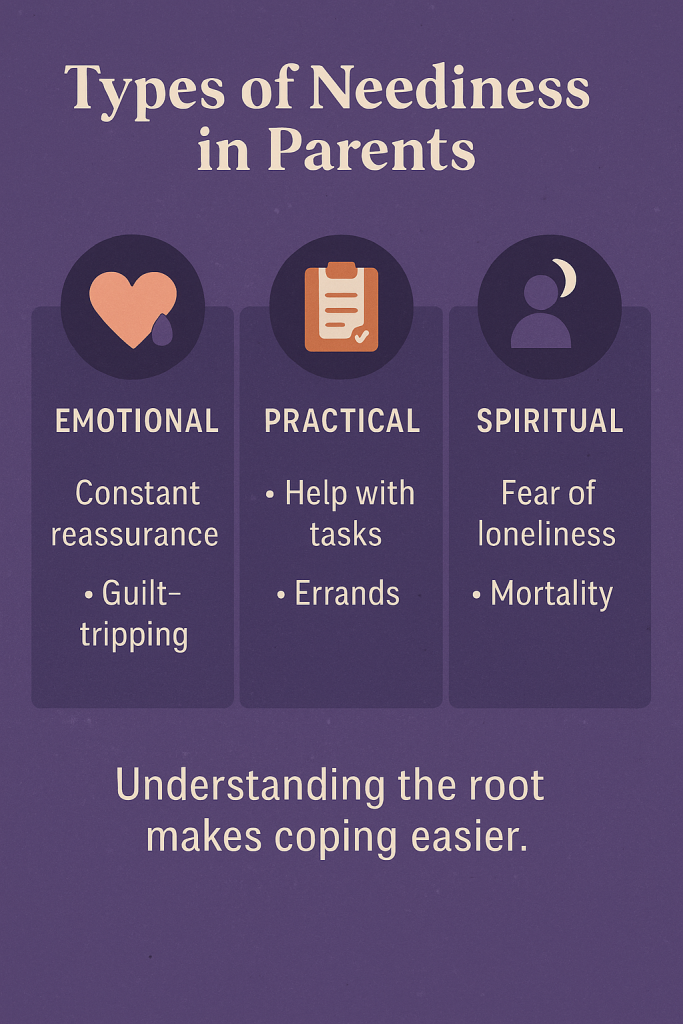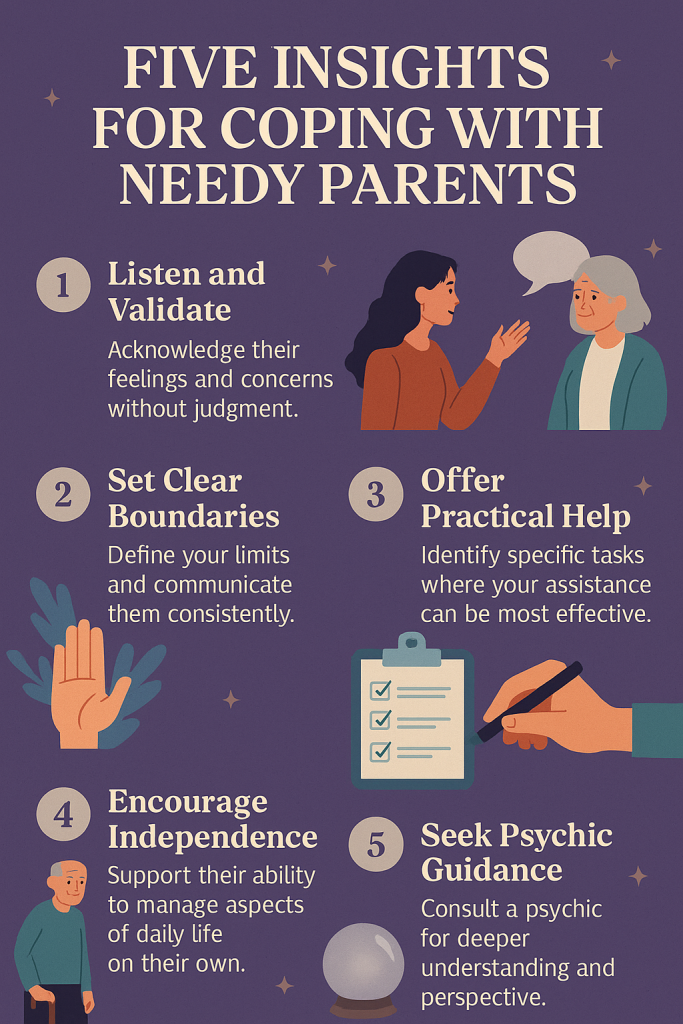Imagine this: you finally settle down after a long day at work, and your phone lights up. It’s your mom, again. She isn’t in danger, she just wants to talk—for the fifth time today. You love her dearly, but you also feel your energy draining, like your life has been hijacked by constant demands.
This isn’t about not loving your parents. It’s about balance. Parents who lean heavily on their adult children often aren’t just “needy”—they may be lonely, afraid of aging, or searching for meaning. And while psychology offers great tools to cope, adding a spiritual or psychic perspective can reveal layers you might not see.
Like planting a tree, the relationship with your parents needs both roots (love, care, connection) and pruning (boundaries, independence, and space). Too much of one or the other, and the relationship suffers. Let’s explore how to strike that balance.
Understanding “Neediness” in Parents

Not all neediness looks the same. Sometimes it’s emotional—constant calls, guilt trips, or asking for reassurance. Other times it’s practical—requests for errands or help with tasks they’re capable of doing. And then there’s spiritual neediness—the fear of irrelevance, loneliness, or even death.
According to Harvard Health, loneliness in older adults is one of the biggest hidden health risks, often linked to depression, heart disease, and even shorter lifespans (Harvard Health). So what feels like clinginess may actually be a silent cry for connection.
From a psychic perspective, “neediness” can also show up as energetic cords of attachment—threads of invisible energy that keep parents and children entangled long after the child has grown. Sometimes these cords are loving; other times, they’re draining. Recognizing them is the first step in deciding whether they need strengthening or gentle loosening.
Why Parents Struggle to “Let Go”
There are several reasons parents cling, and most of them have little to do with you personally.
Cultural norms: Many generations were taught that children owe lifelong devotion and support. Independence wasn’t always a value—it was sometimes seen as disloyalty.
Emotional fears: Aging, illness, or being “left behind” can manifest as constant requests for attention.
Energetic ties: Psychics often describe family dynamics as carrying past-life or ancestral echoes. If a mother was overprotective in one life, she may repeat the same patterns now until awareness breaks the cycle.
Example: A client once came to a psychic frustrated by her mother’s constant calls. In the session, her late father’s presence came through, revealing that the mother’s clinginess stemmed from anxiety about facing mortality alone. That insight didn’t make the behavior vanish, but it helped the daughter approach it with compassion instead of irritation.
The Emotional and Energetic Toll on Adult Children
For adult children, needy parents can create a double bind: the guilt of not doing enough, and the resentment of doing too much. Over time, that pressure can feel like your aura—or emotional field—is being constantly drained.
The American Psychological Association notes that family caregiving, even when motivated by love, is strongly linked to stress, depression, and physical health issues (APA). Add in the spiritual drain of constant energetic cords, and it’s no wonder many people feel exhausted.
Think of it this way: your energy is like a phone battery. Parents may not realize they’re running endless apps in the background, leaving you with nothing left for yourself. Without recharging and setting usage limits, burnout is inevitable.
Healthy Boundaries: Practical and Spiritual
Boundaries are not walls; they’re doorways with locks. They allow love in, but they also protect your peace. Many adult children feel guilty for setting boundaries with parents, but in truth, boundaries are an act of love—for both sides. They preserve respect and prevent burnout.
Psychological Approaches
Assertive communication: Instead of “You’re overwhelming me with calls,” try “I feel drained when my phone rings so often, can we set a time to chat every evening?”
Scheduling: Structure creates safety. A weekly coffee date or designated call time ensures your parents feel prioritized without consuming your entire week.
Reframing guilt: Guilt often signals that you’re doing something new, not that you’re doing something wrong. Healthy limits benefit everyone.
Spiritual and Psychic Approaches
Cord-cutting rituals: Visualize unhealthy energy cords between you and your parents being gently released. This doesn’t cut love—it clears out the draining parts of the bond.
Grounding exercises: After a visit or a long call, walk barefoot on the ground or hold a grounding stone like hematite to restore your energy.
Energy protection: Before family interactions, visualize a bubble of light around you. Many psychics use this daily to maintain clear energy.
Example
Emma, a 42-year-old teacher, struggled with her mother’s daily guilt-laden phone calls. In therapy, she learned assertive communication. In psychic sessions, she practiced cord-cutting meditations. The blend of the two helped her set limits while still approaching her mother with love. Over time, her mom actually grew calmer, sensing the daughter’s energy was steadier.
Boundaries, both practical and energetic, don’t make you a “bad child.” They make you a sustainable one.
How Psychic Readings Can Help in Parent-Child Dynamics
Psychic insight doesn’t replace therapy or healthy communication, but it can reveal what’s hidden beneath the surface. Parents may not always articulate their fears or needs, yet their energy often speaks volumes.
Mediumship for Healing Family History
Sometimes what appears as “neediness” is really unresolved grief. A medium connecting with a deceased spouse or parent can bring comfort that reduces clingy behavior. For example, one woman’s mother constantly asked her to visit, fearing she’d be left alone. In a reading, the late father came through with a message that he was still watching over her. Afterward, the mother’s anxiety softened, and her demands lessened.
Tarot and Astrology for Timing Conversations
Tarot spreads can shed light on the best time to set boundaries or initiate difficult talks. Astrology, too, can reveal family karmic dynamics—like parent-child roles that feel “reversed” because of Saturn or Moon placements. Knowing the cosmic backdrop can make tough discussions flow more smoothly.
Validating Root Fears
Psychics often pick up on the emotions parents don’t say out loud: fear of irrelevance, worry about health, or regret about missed opportunities. For the adult child, hearing “your father’s nagging is really about his fear of losing purpose” can transform irritation into empathy.
Example
David booked a psychic session after endless arguments with his father about “irresponsibility.” The reading revealed that the father’s criticism came from unfulfilled dreams of his own youth. Instead of resentment, David felt compassion—he began responding with understanding, and the tension at home slowly dissolved.
Expert Insight
Psychology Today points out that setting boundaries with aging parents is not just healthy—it’s necessary for mutual respect (Psychology Today). Psychic perspectives add depth to this advice by illuminating the unspoken energies driving those boundary struggles.
Cultural and Spiritual Layers
What we label as “needy” in parents can look very different depending on cultural and spiritual lenses. In some traditions, what feels like over-dependence is actually seen as respect, duty, or sacred responsibility.
Cultural Expectations
In many Asian, Latin American, and Mediterranean cultures, multigenerational households are common, and adult children are expected to be central caregivers. Needing daily connection isn’t seen as clinginess but as family loyalty.
In Western cultures, independence is prized, and a parent calling every day may be viewed as intrusive. The same behavior, two different interpretations.
Spiritual Traditions
Hinduism honors the idea of seva (service), where caring for parents is part of spiritual duty and creates positive karma.
Indigenous traditions often see elders as wisdom keepers, not burdens, and encourage young people to learn from their stories.
Buddhism frames care for aging parents as a practice of compassion and mindfulness, a way of embodying the teachings.
Psychic Reframe
From a psychic perspective, parents’ clinginess may reflect their own spiritual searching. A mother who constantly asks for reassurance may really be expressing a soul-level fear of losing her role and identity. When viewed as part of her spiritual path, it becomes less about “neediness” and more about her growth process.
Example
Marisol, a first-generation daughter of Mexican immigrants, often felt trapped by her parents’ expectations to be present at every family gathering. During a psychic session, she was reminded that her parents’ needs came from cultural tradition, not manipulation. Instead of resentment, she reframed her role as bridge-builder: honoring tradition while setting gentle boundaries.
When cultural, psychological, and spiritual dimensions come together, “needy parents” shift from being a burden to being human beings navigating their own unfinished lessons.
Practical Steps to Cope with Needy Parents (With a Psychic Twist)

Finding balance with needy parents isn’t about shutting them out; it’s about creating a flow where love circulates without draining you. Here are steps—both practical and psychic—that can help.
1. Communicate Compassionately
Instead of accusing, try “I” statements.
Say: “I feel tired when I get multiple calls during work hours. Could we set a regular time to chat?”
Not: “You’re smothering me.”
This softens defenses and makes boundaries feel like care, not rejection.
2. Schedule Time Together
Setting predictable contact points creates structure and prevents overwhelm. A weekly lunch or a nightly call signals love without letting demands creep into every corner of your day.
3. Encourage Their Independence
Suggest activities that enrich their lives outside of you. Clubs, hobbies, or volunteering can combat loneliness. Harvard Health even highlights the importance of community in countering isolation among older adults (Harvard Health). Sometimes, the best gift is gently nudging them toward new connections.
4. Create Shared Rituals
Instead of endless small calls, anchor connection in meaningful practices:
Light a candle together on video call once a week.
Share a daily gratitude text.
Hold a family prayer or meditation circle.
This builds depth, not just frequency.
5. Use Psychic Tools for Energy Balance
Cord-cutting visualization: Imagine releasing draining cords, leaving only love intact.
Grounding practices: After emotional talks, stand barefoot on the earth or use grounding crystals like hematite.
Tarot/astrology timing: Consult a reader to discover when it’s best to set boundaries or have big conversations.
6. Seek Guidance When Patterns Repeat
If the same conflict plays out again and again, a psychic reading can uncover karmic or ancestral layers. One client discovered through a reading that her mother’s controlling behavior wasn’t personal—it was a generational pattern of fear handed down from grandmother to mother. Knowing this freed her from guilt and gave her compassion to set firm but loving boundaries.
Example
Carlos, an only child, often felt suffocated by his father’s constant criticism and demands. In therapy, he practiced communication skills. In a psychic session, he learned his father’s behavior stemmed from his own abandoned dreams of success. This mix of insights shifted Carlos from anger to empathy—he began encouraging his dad to pursue small projects again. Surprisingly, the father’s “nagging” eased.
Reframing the Relationship for Healing
Sometimes the word “needy” itself creates distance. When we reframe parents not as burdens but as human beings navigating their own fears, a new layer of compassion opens. Psychic insight often helps shift this perspective by showing what lies beneath the surface of their behavior.
From Irritation to Empathy
A psychic once explained to a daughter that her mother’s endless phone calls were not about control, but about fear of being forgotten—the same fear her grandmother had expressed decades earlier. Recognizing this intergenerational pattern turned the daughter’s annoyance into empathy. Instead of dreading the calls, she reframed them as echoes of love, even if clumsily expressed.
Healing Generational Wounds
Psychic readings often reveal cycles that span generations. A father’s harshness might reflect his father’s unhealed trauma. A mother’s constant worry may stem from the scarcity mindset of her parents. Seeing these threads helps adult children understand: “This isn’t about me—it’s about a larger story.” With that, resentment softens.
Spiritual Opportunity
In many traditions, family is seen not just as a responsibility but as a spiritual classroom. Parents test our patience, mirror our wounds, and offer us the chance to practice compassion without losing ourselves. Psychic tools, like mediumship or ancestral readings, can help us see these dynamics as sacred contracts rather than random burdens.
Example
Leah, who felt suffocated by her mom’s demands for attention, discovered in a reading that her mother’s clinginess mirrored her grandmother’s fear of abandonment. This insight helped Leah recognize that the dynamic was generational, not personal. She stopped blaming herself for not being “enough” and started setting firmer boundaries—without guilt.
By reframing neediness as a form of unfinished healing, you gain freedom. You can honor your parents’ journey without letting it consume yours.
Conclusion: Love with Boundaries, Compassion with Energy
Coping with needy parents doesn’t mean cutting them off or losing yourself—it means finding the balance between care and independence. You can love your parents deeply and still say “no” when your energy is running low. In fact, healthy limits often deepen connection, because they allow you to show up with authenticity instead of resentment.
Psychic insight adds another layer, reminding us that what looks like clinginess may actually be unspoken fears, generational patterns, or soul lessons. By blending practical psychology with spiritual tools—communication, boundaries, cord-cutting, and reframing—you create space for both compassion and freedom.
Caring for your parents doesn’t require dimming your own light. It means learning to shine side by side, each of you carrying your own torch on the shared path of family and growth.
Frequently Asked Questions
1. What does “needy” mean when it comes to parents?
Patterns of frequent requests for attention, reassurance, or help that exceed your bandwidth and create guilt, resentment, or burnout.
2. Why do some parents become more needy with age?
Loneliness, health changes, fear of irrelevance, and shrinking social circles can increase emotional and practical dependence.
3. How do I set boundaries without hurting their feelings?
Lead with care and clarity: name your limit, offer a reasonable alternative, and keep the tone warm and consistent.
4. What if guilt stops me from setting limits?
Reframe guilt as a sign of growth, not wrongdoing. Healthy boundaries protect the relationship and your wellbeing.
5. Are there signs I’m experiencing caregiver burnout?
Chronic fatigue, irritability, dread of contact, and neglecting your own needs are common indicators.
6. How can psychic insight help with needy parents?
Readings can reveal unspoken fears, ancestral patterns, timing for tough talks, and energy tools to reduce emotional drain.
7. What is an energetic cord and how do I “cut” it safely?
An energetic cord is a repeated emotional pull. Visualize releasing the draining aspect while keeping love and respect intact.
8. Is it okay to screen calls or schedule contact?
Yes. Scheduled calls or check-ins provide predictability for your parents and preserve your focus and energy.
9. How do I respond to guilt trips or passive-aggressive comments?
Reflect feelings, restate your boundary, and redirect: “I hear you’re lonely. Let’s talk tonight at 7 like we planned.”
10. What if my siblings aren’t helping?
Ask specifically (“Can you take Wednesdays?”), document needs, and consider a rotation. Avoid rescuing by default.
11. How can I encourage my parents to build their own support?
Suggest clubs, faith groups, classes, or volunteer work. Offer to help them try one new activity, then step back.
12. When should I involve a therapist or doctor?
When neediness stems from depression, anxiety, cognitive decline, or when your wellbeing is consistently compromised.
13. How do I keep boundaries during emergencies?
Handle the acute issue, then reset expectations: clarify what is emergency-worthy and what can wait for regular times.
14. Can mediumship help our family heal grief that fuels neediness?
It can bring comfort and closure, reducing anxious clinging by affirming continued bonds with those who have passed.
15. What do I say the first time I set a firm limit?
“I love you. I can’t answer calls during work. Let’s talk Tuesdays and Fridays at 7. I’m looking forward to it.”
16. How do I handle repetitive requests for minor tasks?
Offer a how-to once, write it down, or record a short video. Encourage self-reliance and celebrate small wins.
17. How do culture and tradition affect what counts as ‘needy’?
Some cultures normalize frequent contact and shared living. Align with your values while setting humane limits.
18. What if they say I’m selfish?
Stay calm, restate your care, and hold the line. Self-care sustains your ability to show up consistently.
19. How can tarot or astrology help with timing boundary talks?
Readers can suggest windows for smoother conversations and highlight recurring family themes to address.
20. How do I prevent late-night “urgent” texts?
Set a quiet-hours rule. Offer an emergency-only channel and define emergencies clearly together.
21. What if I’m the only nearby child?
Build a local network: neighbors, community services, rideshares. Share a simple “care map” so you’re not the sole responder.
22. How do I de-escalate when emotions run high?
Pause, breathe, name the feeling, then propose a time-out: “Let’s revisit this after dinner when we’re calmer.”
23. How often should I check in?
Pick a cadence that you can sustain—e.g., two calls weekly and one in-person visit monthly—and stick to it.
24. What are quick grounding practices after heavy calls?
Shake out your hands, step outside, slow-breathe for one minute, or hold a grounding stone like hematite.
25. How do I talk about bigger supports without shaming them?
Use collaboration: “Let’s build a team so you have more company and I can be more present when we talk.”
26. Can I make shared rituals so we connect with less chaos?
Yes. Weekly tea, gratitude texts, prayer, or candle-lighting creates meaningful connection without constant contact.
27. What if they ignore boundaries?
Repeat calmly, enforce consequences (call-back at the scheduled time), and follow through consistently.
28. How do I handle money requests?
Set a written policy (amount, frequency). Offer budgeting help or resources instead of on-demand transfers.
29. What if I feel responsible for their happiness?
Compassion isn’t control. You can contribute to their support system, but their wellbeing isn’t yours to carry alone.
30. When is it time for a psychic reading about this?
When patterns repeat, timing feels unclear, or you need insight into root fears and how to set limits with love.





The emphasis on finding support systems is very pertinent. It’s essential for both the parent and the caregiver to not feel isolated.
The involvement of extended family and friends can really make a difference. Knowing that others can check on your parents can provide peace of mind.
Indeed, having a support network can significantly alleviate the stress of caring for an aging parent, making the experience more manageable.
I appreciate the suggestion to schedule time with parents. It ensures that they feel valued while also giving oneself the necessary space to manage other responsibilities.
Yet another article telling us to ‘set boundaries’ as if that’s the magical solution to all family problems. Has the author actually tried telling a needy parent they need boundaries? Good luck with that!
Ah, so the solution to dealing with needy parents is to hand them off to neighbors and friends? Brilliant! Maybe next time, the advice will be to outsource parenting back to the grandparents so the cycle never ends!
It’s interesting to note the psychological aspect emphasized here. The author wisely points out that maintaining one’s own mental health is crucial when caring for demanding parents. Also, the suggestion of finding support systems is particularly valuable.
Encouraging parents to engage in social activities is an excellent idea. It can help them build a support system outside of their immediate family.
The final point about not feeling guilty for one’s success resonates deeply. Parents often need time to adjust, and it’s important to recognize that their feelings are part of a natural transition.
This article provides such a compassionate and practical approach to dealing with needy parents. Establishing boundaries and scheduling time really highlights the importance of mutual respect and understanding in familial relationships.
Honestly, this advice sounds overly simplistic. The dynamics of family relationships are far too complex to be solved by merely setting boundaries or scheduling visits. This article barely scratches the surface.
This article provides a balanced perspective on caring for aging parents while maintaining one’s own well-being. Setting boundaries seems particularly crucial for a healthy relationship.
Comments are closed.